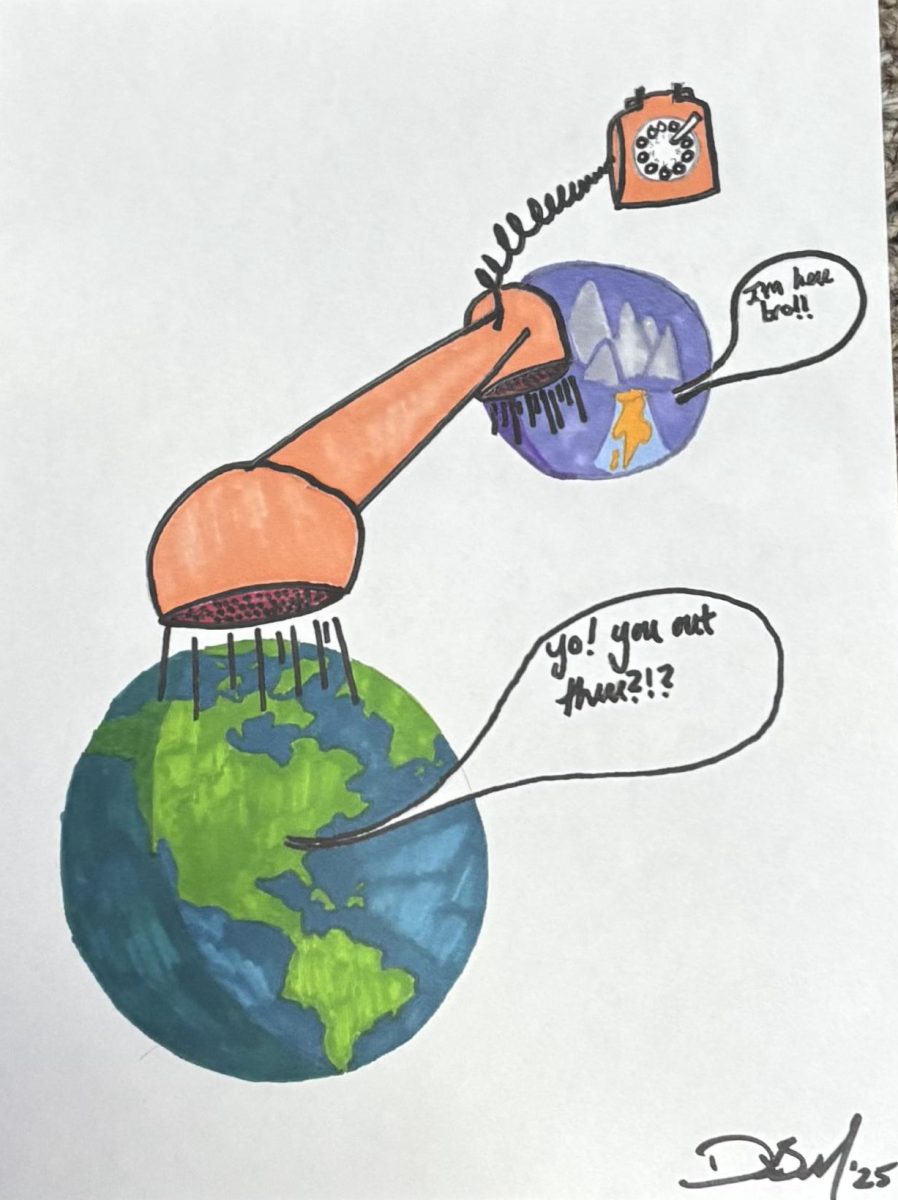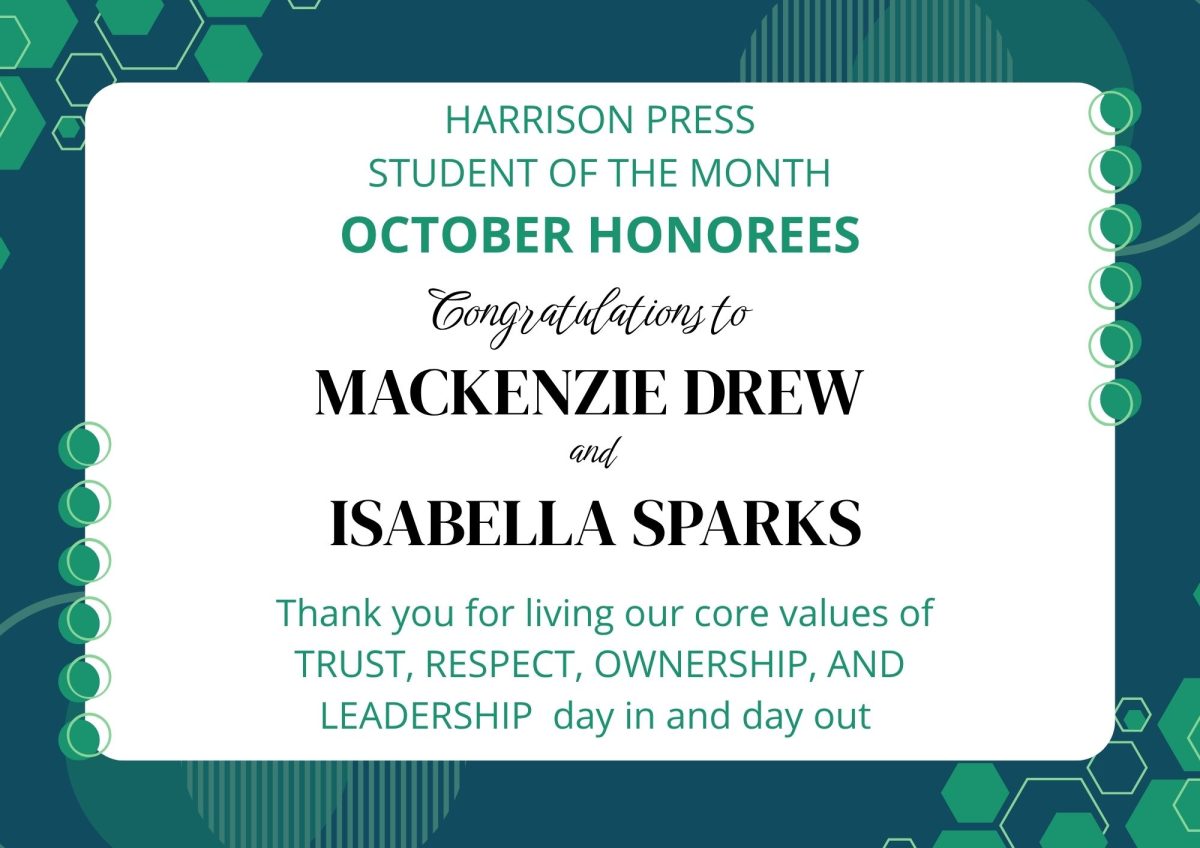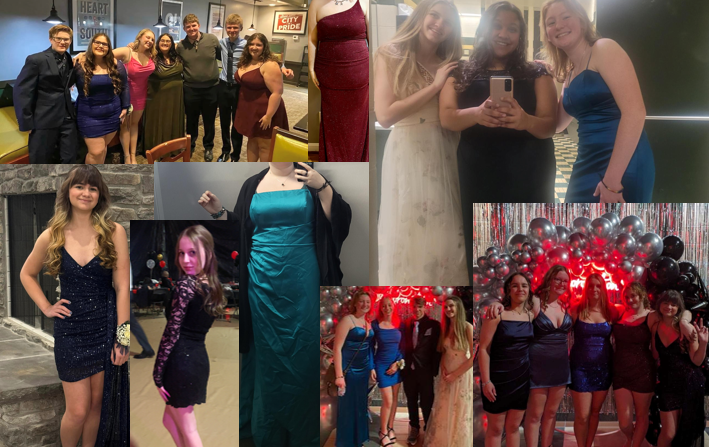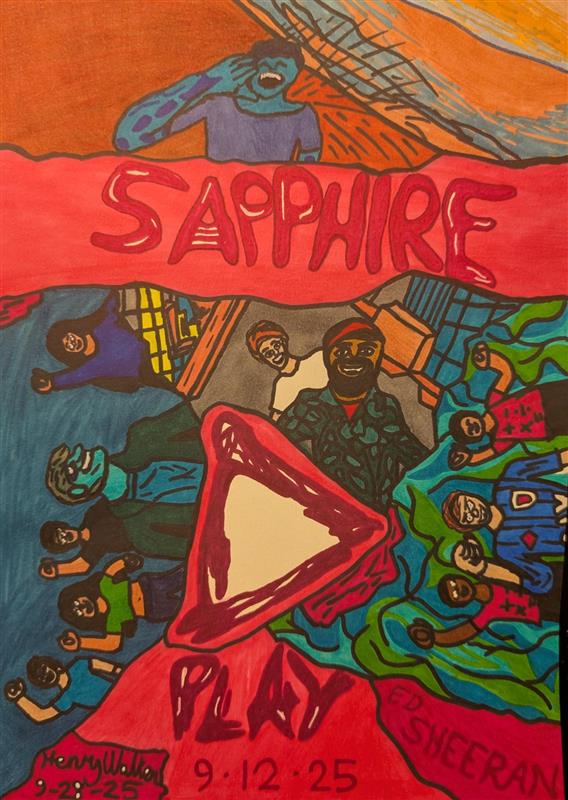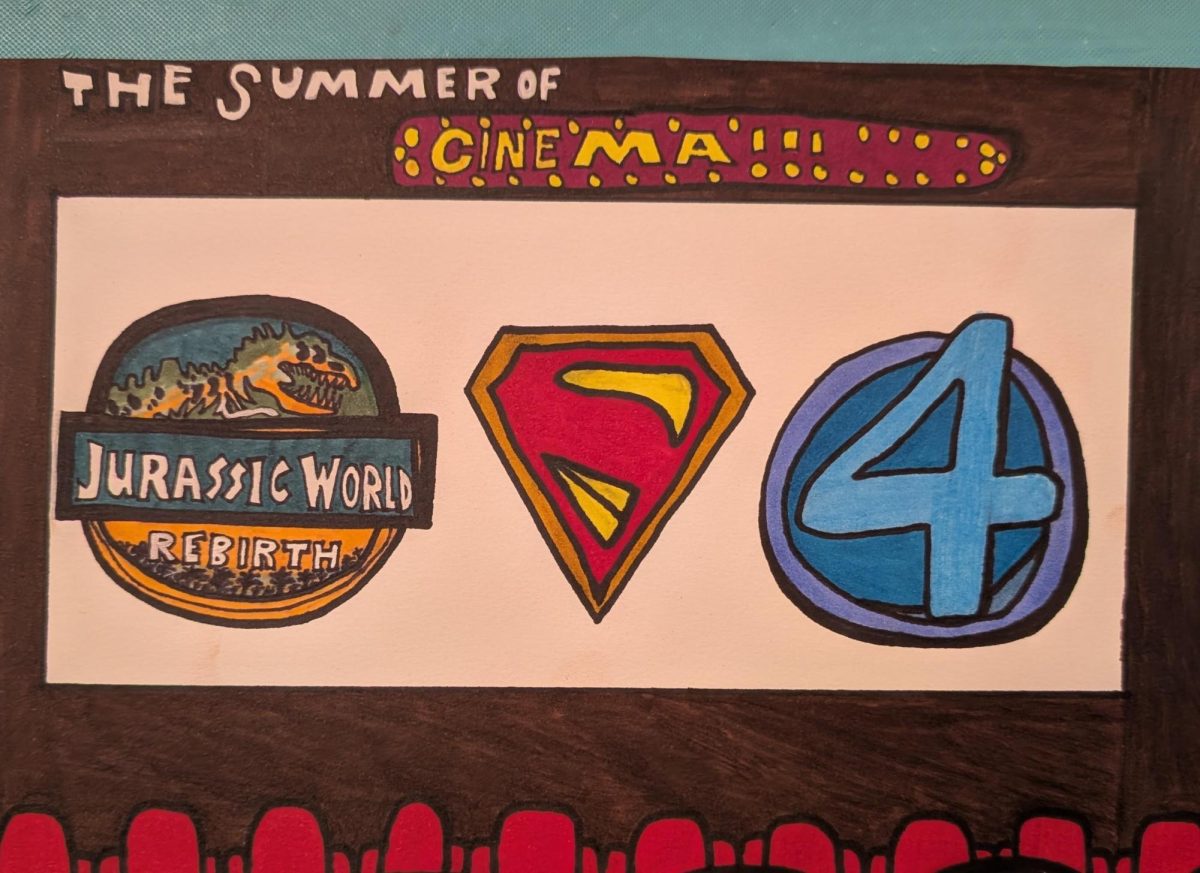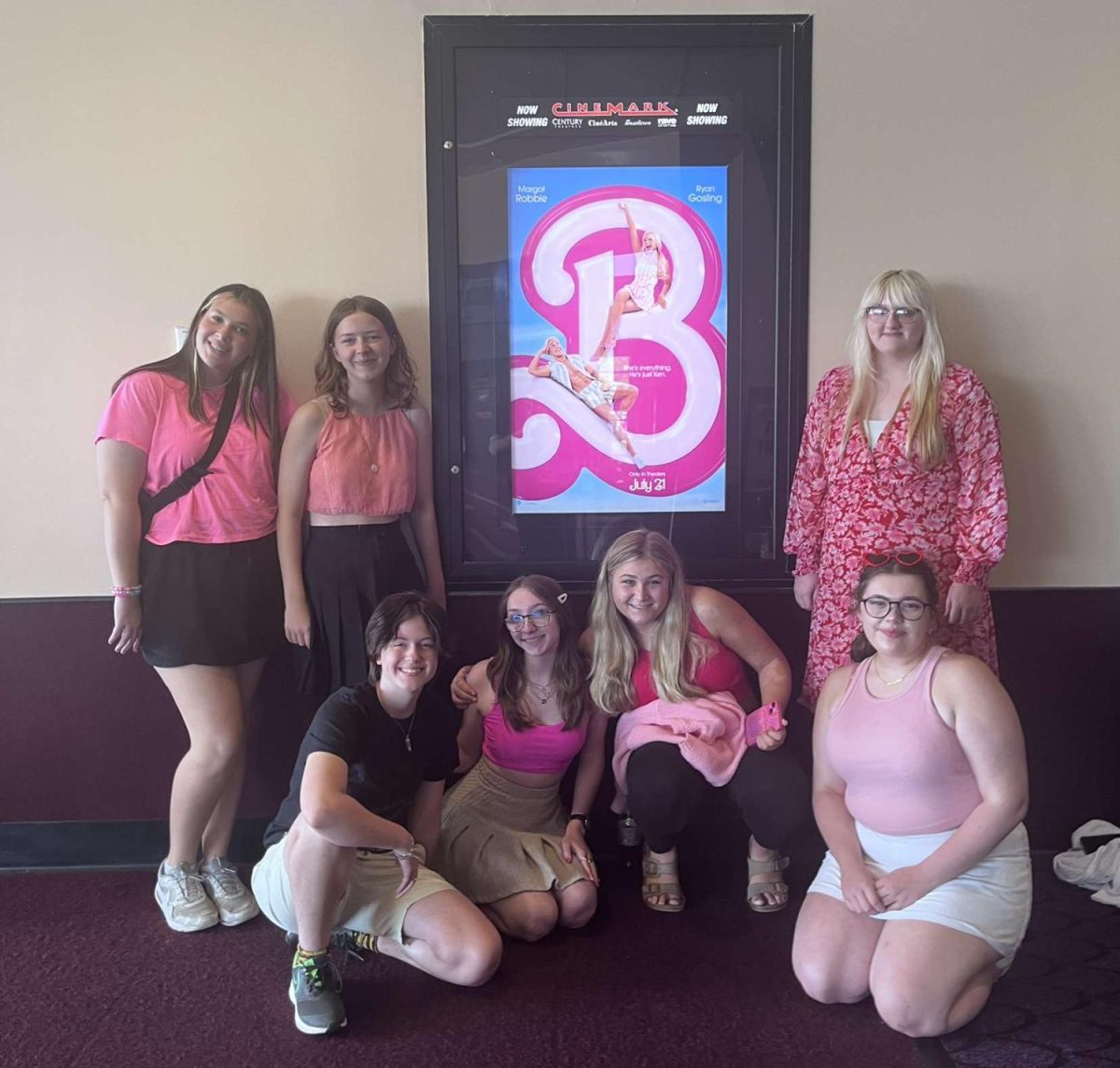In Barbie Land, every night is girls night–and while this may not be feasible for women in the real world, be sure to schedule in a movie night to watch Barbie (2023).
The movie, which opens with an homage to Stanley Kubrick’s 1968 film 2001: A Space Odyssey, quickly captivates audiences as we watch a group of prehistoric little girls demolish their old dolls in favor of a giant Barbie doll. We then follow Stereotypical Barbie, expertly played by Margot Robbie, into her beautiful- and very pink- Dreamhouse in Barbie Land. The setting of Barbie Land is intensely captivating, with set creation even leading to a shortage of pink paint. One highlight of this movie is the attention to detail. Watching it felt like playing with Barbies as a little kid- details like a lack of running water in the dreamhouse, pretend eating and drinking, or Barbie simply floating down from her balcony instead of taking the steps all are reminiscent of how a child would play with their dolls. Furthermore, the costume design was stunning, with Stereotypical Barbie alone donning nearly 40 different outfits throughout the film.
However, just like Barbie herself, this movie was more than just appearances. Plotwise, the film follows Stereotypical Barbie as she has an existential crisis and leaves Barbie Land behind to begin fixing her issues (like cellulite or flat feet) in the human world. She is accompanied by her long term, long distance, low commitment, casual “boyfriend” Ken (Ryan Gosling), who perfectly encapsulates the persona of Ken. Thanks to the advice of Weird Barbie (Kate McKinnon), who theorizes that Barbie’s existential crisis is caused by the girl playing with Stereotypical Barbie in the real world, Barbie and Ken journey to the real world to try and find her.
Once they reach the real world, Barbie and Ken very quickly realize that they aren’t in Barbie Land anymore. One highlight of this film is its boldness and ability to tackle important issues, such as the objectification of women, through a serious lens while also remaining a funny and lighthearted movie. Barbie is an undeniably beautiful, confident woman- and this movie isn’t afraid to show the consequences of being an empowered woman in a patriarchal society. While Barbie is faced with constant degradation (such as catcalls), Ken begins to realize the joys of being a man in a place where men have inherent power. He revels in flawed notions of what the patriarchy is–and for him, it mostly consists of horses.
While Ken discovers the wonders of the real world, Barbie continues her mission of finding the girl causing her issues. When Barbie goes to a school and thinks she found the girl, she is quickly humbled when the girl, Sasha (Ariana Greenblatt), belittles Barbie, calling her consumerist, stereotypical, and harmful to women. Barbie is horrified; in Barbie Land, the very idea of Barbie promotes female independence and supports that women can do anything. Barbie Land is full of empowered women- women there are lawyers, astronauts, the president, the supreme court, and more. The Barbies have faith in themselves- as one received a nobel prize, she states “I worked hard. I deserve this.” They compliment each other endlessly, and they affirm themselves, with one stating “I feel beautiful!”
When watching this movie, it felt weird to hear such bold affirmations from women. And it shouldn’t- why do people have to take a step back when accomplished women are proud of themselves, and why is it so shocking to hear a woman affirm a compliment?
Questions like these frame Barbie’s difficult experience in the real world. As Barbie struggles to cope with Sasha’s harsh words, the movie ultimately returns to Ken as he goes back to Barbie Land and shares his flawed notions of male empowerment with all of the other Kens and Barbies.
Ken quickly makes Barbie Land unrecognizable- Barbie’s Dreamhouse becomes Ken’s Mojo Dojo Casa House, horses begin to run amok, and the Barbies are stripped of their power and become simple accessories for the Kens.
This movie is full of role-reversal upon role-reversal; the movie starts with the Kens having few wants or desires other than the attention and approval of the Barbies, and when Ken takes over, the Barbies are the ones who become minimized to their relationships with others.
Ultimately, the Barbies regain control over Barbie Land, with the effort being led by Stereotypical Barbie and the mother and daughter that caused her issues in the real world, Gloria and Sasha. While Gloria, Sasha’s mother, arguably delivers some of the most poignant lines of the film in her monologue on the difficulties of being a modern woman, I also have to criticize the role of Gloria in Sasha in the film. Both of their characters and relationship with the overall story felt slightly underdeveloped- and while the mother-daughter experience is relevant to the feminist themes the story focused on, at some points it felt like the movie attempted to do “too much,” reducing the overall impact that these characters had on the story.
Ultimately, Gloria and Sasha help Stereotypical Barbie to deprogram the rest of the Barbies and return Barbie Land to the pink utopia shown at the beginning of the movie. However–this conclusion leads to an important question–what do the Kens do now?
This question is answered in one of the final scenes of the movie, in which Stereotypical Barbie and Ken finally discuss their relationship. Barbie doesn’t want a relationship with Ken, but she cares for him deeply and tries to help him. She urges him to move on from her and develop his own interests and personality. This scene shows the growth of both characters throughout the film; Barbie has learned the difficulties of living in the shadow of someone else, and can now empathize with Ken and give him advice on how to get over her. Ken has finally gotten his wish of being in the spotlight–however briefly, and now feels more prepared to embrace himself. Barbie also receives her wish of becoming a real woman living in the real world–and, aptly, the final scene is of her beaming as she enters a gynecologist’s office.
Despite minor criticisms, I would rate this movie a 9/10. It is the perfect blend of comedy and serious commentary, and I still either regularly quote scenes or question important topics it discusses on a regular basis. I surveyed Harrison students on their opinions on the movie, and they were overwhelmingly positive about the movie as well, rating it (on average) an 8.8/10, with 94% of respondents stating they would recommend the film to others. Respondents also echoed the importance of both comedy and serious discussions in the movie; when asked about their favorite moments, some focused on humorous scenes such as “SUBLIME!”, “I am Kenough”, or the chase scene where the (entirely male!) Mattel Board chases Barbie through their office building, while others focused on much more emotional aspects, like one survey respondent who mentioned “I really love the part where Barbie is crying at the bus stop and she turns over to the old lady next to her, and she tells her that she’s beautiful. I think it’s a really powerful scene about women lifting each other up.”
Another survey respondent mentioned “I think it was an impactful movie for women and girls who played with Barbie growing up. It wasn’t meant to put down men, it was meant to reverse the gender roles in Barbie world to shed light on the experience and patronization of women.” Other survey comments included “Really changed my perspective on life.”, “So good. A must watch with your mother.”, “It’s a really great movie about womanhood and how we bond, as well as having a fun & creative aspect to it.”
Overall, both myself and survey respondents seemed overwhelmingly positive about the film. It has the perfect mix of comedy, nostalgia, and commentary- all wrapped up in a wonderfully immersive pink bow.
Did you like the Barbie movie? Tell us down below!














